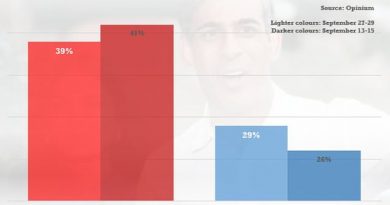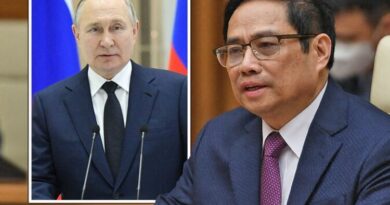NATO: The Secretary General who ‘has done a great job’ – who is Jens Stoltenberg?
NATO: Jens Stoltenberg a 'nuclear war can never be won'
We use your sign-up to provide content in ways you’ve consented to and to improve our understanding of you. This may include adverts from us and 3rd parties based on our understanding. You can unsubscribe at any time. More info
In recent months the North Atlantic Treaty Organisation (NATO) has crept further into the public light owing to the war between Russia and Ukraine. Russian President Vladimir Putin has blamed expansion by the military alliance in eastern Europe as one of his key reasons for launching the invasion in February.
To date, NATO has refused to become physically involved in the fighting between Russia and Ukraine.
Instead allies within NATO responded by hitting Russia with a raft of sanctions.
Requests from Ukraine’s President Volodymyr Zelensky for a no-fly zone above Ukraine have also been outright rejected by NATO and the West.
Mr Stoltenberg has previously said helping Kyiv protect its skies from Russia’s missiles and warplanes would require its forces to shoot down Russian aircraft – a move that could result in a “full-fledged war in Europe involving many more countries”.


Aged 63, Mr Stoltenberg has held the role of Secretary General since October 2014.
The job essentially involves acting as an international diplomat who represents NATO in a public-facing capacity.
Phil Osborn CBE, a retired Air Marshal with the RAF, told Express.co.uk the position requires someone who is “capable of performing a difficult balancing act”.
He said: “Getting 30 nations to agree sufficiently to a position and then act as one coherent group is always a challenge, especially when those nations are of different sizes and influence, and have very clear national and international agendas.

“When there isn’t an obvious threat, they have to cope with questions around the relevance of NATO and its cost, and the nature of its role beyond Europe.
“Conversely, when the threat is clear, they are the point of the diplomatic spear, needing to speak clearly and forcefully to reinforce strength and deterrence through the language of collective will and readiness.”
Before joining the military pact Mr Stoltenberg enjoyed a fruitful political career back in his country of birth, Norway.
Among other positions, he worked as the State Secretary at the Ministry of the Environment and as the Minister of Industry and Energy.
DON’T MISS:
‘Destroying our soul!’ Macron accused of ‘LYING’ to French voters [EXPLAINED]
Brexit LIVE: Boris told he MUST use 1988 to protect UK waters [LIVE]
Ian Blackford shamed over Queen ‘cover story’ to boost SNP [NEWS]

Eventually, he became the Norwegian Prime Minister in 2000 and would go on to lead Norway’s Labour Party between 2002 and 2014.
While Mr Stoltenberg was PM, Norway’s defence spending increased steadily, resulting in the country today being one of the allies with the highest defence expenditure per capita.
He has also been instrumental in transforming the Norwegian armed forces through a strong focus on deployable high-end capabilities.
During his tenure as PM, Mr Stoltenberg frequently called for NATO to focus on security challenges close to allied territory.
As Secretary General, Mr Stoltenberg has helped to lead a united NATO front against the Russian invasion.
However, Mr Osborn cautioned that there will “still be real challenges” for member states to face up to in the coming months.
He highlighted the importance of NATO members continuing to unite behind actions, especially if Russia attempts to “drive a wedge between different NATO members”.
Mr Stoltenberg is due to step down as Secretary General by September 2023, though a number of members have expressed their desire for him to stay on beyond this point.
Assessing his performance as Secretary General, Mr Osborn said his sense is that the Norwegian “has done, and is doing a great job”.
He added that whether he continues in the position though will depend on “what is happening in Ukraine and elsewhere, and the quality of the likely replacements”.
Source: Read Full Article




